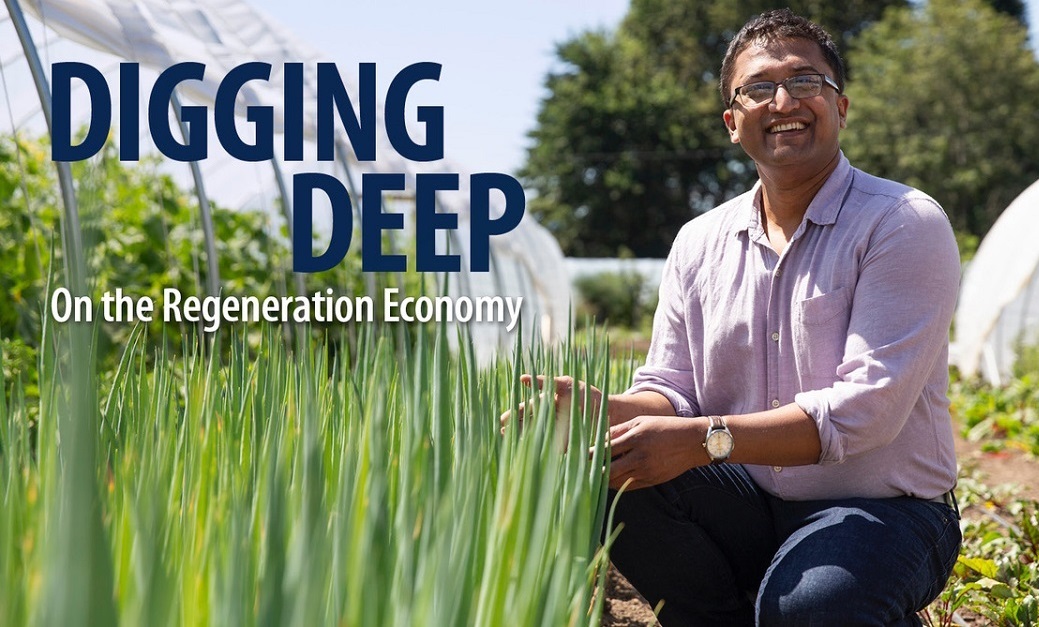By Sasha Milam. Originally published in the summer 2020 issue of Business Class magazine.
In his recently defended dissertation, Dr. Saeed Rahman, PhD ’20, presents a new slant on the emerging idea of integrating ecological and business knowledge. Through dozens of interviews, his research explored how farmers in BC seek, create and use ecological knowledge in their businesses, and what the implications of this might be for other industries. Rahman, the fifth graduate of the Sardul S. Gill Graduate School’s Doctor of International Management program, recently caught up with Business Class about this burgeoning field of study.
BUSINESS CLASS: How would you define ecological knowledge, and why did you start by studying how organic farmers use it?
SAEED RAHMAN: Ecological knowledge is a recognition of the interdependence of the different components of the ecosystem: how we are rooted in our natural environment, the system of which we are an embedded part. I studied how organic farmers in BC conceptualize, co-create and use this knowledge partly because the ties between their businesses and the ecosystem are very clear and immediate. If the soil degrades or deforestation impacts the overall system, organic farmers are often first to feel the effects. They also are ahead of the curve in terms of articulated vision and mission for how they want to interact with the ecosystem through their work.
BC: If you had to explain your results in 25 words, how would you phrase it?
SR: Businesses can engage directly and strategically with nature to protect or enhance their supply of natural capital and build greater stability of the human-nature systems in which they are embedded.
BC: What was one thing that surprised you about your research?
SR: How far past other businesses’ ideas of sustainability the organic agriculture industry had already moved. Many of the people I spoke with directly connect their worldview and business values to the idea of regeneration, of reciprocity and working within the closed loop of the ecosystem.
One farmer I interviewed said it very clearly: “I don’t believe in sustainability. Sustainability is the idea that we can keep taking at the rate that we’ve always been taking. Sustainability is over. Now, the new economy is about the regeneration economy.”
BC: Are any other industries or companies integrating ecological knowledge?
SR: Yes. In fact, my decision to study this topic for my dissertation was based on a case study of Barilla, coauthored by my dissertation supervisor Dr. Monika Winn. The pasta manufacturer reached outside of traditional organizational boundaries to understand, co-create and integrate ecological knowledge alongside the wheat growers who supplied their raw materials. The study demonstrated how the company’s efforts to help farmers transition away from monocropping to more sustainable methods had far-reaching effects within the company and community. Examples include increased production yields, reduced environmental impact and economic, social and ecological benefits for farmers, the community and the organization. Patagonia has also received attention for ecologically-aware initiatives. So it’s not just food production or small-scale farmers that can benefit from understanding their role in the ecosystem, and adjusting business practices accordingly.
BC: With regards to your PhD journey, do you have any advice for people thinking about taking that step themselves?
SR: A PhD can be a stimulating and wonderful experience; however, the journey can involve a lot of stress and many challenges as well, so it’s important to consider these ahead of time. My advice for people wanting to explore this path is to undertake thorough financial planning, carefully choose your PhD supervisor and keep sight of why you’re doing it.
I always knew that I wanted to become an academic, which undoubtedly is one of the world’s best jobs! I had the motivation to pursue the goal of making a tangible social impact, and I believe that an academic— through meaningful teaching or research—can have a visible impact on our society. The feeling that you are contributing to enhancing the boundary of human knowledge can be exciting and wonderful.
One trait that I think is essential to one’s success in a PhD is perseverance. Be prepared to endure and deal with a lot of uncertainties, rejections, frustrations and failures. But, never give up, be kind to yourself and keep on trying, and you can overcome all these.
BC: What is the headline of the article you hope we’ll be writing about your work in 10 years?
SR: Picking just one would be hard! Here are four angles I think will be interesting to explore in the future:
• Organizational change for regenerative sustainability
• Conceptualizing a regenerative sustainability-based business model
• Measuring the impact of regenerative sustainability
• Strategy for regenerative sustainability
Rahman’s research was supported by the Pacific Institute for Climate Solutions, Social Sciences and Humanities Research Council of Canada, and the Dr. Ian Stuart Memorial PhD Award.
Photo: UVic Photo Services.


